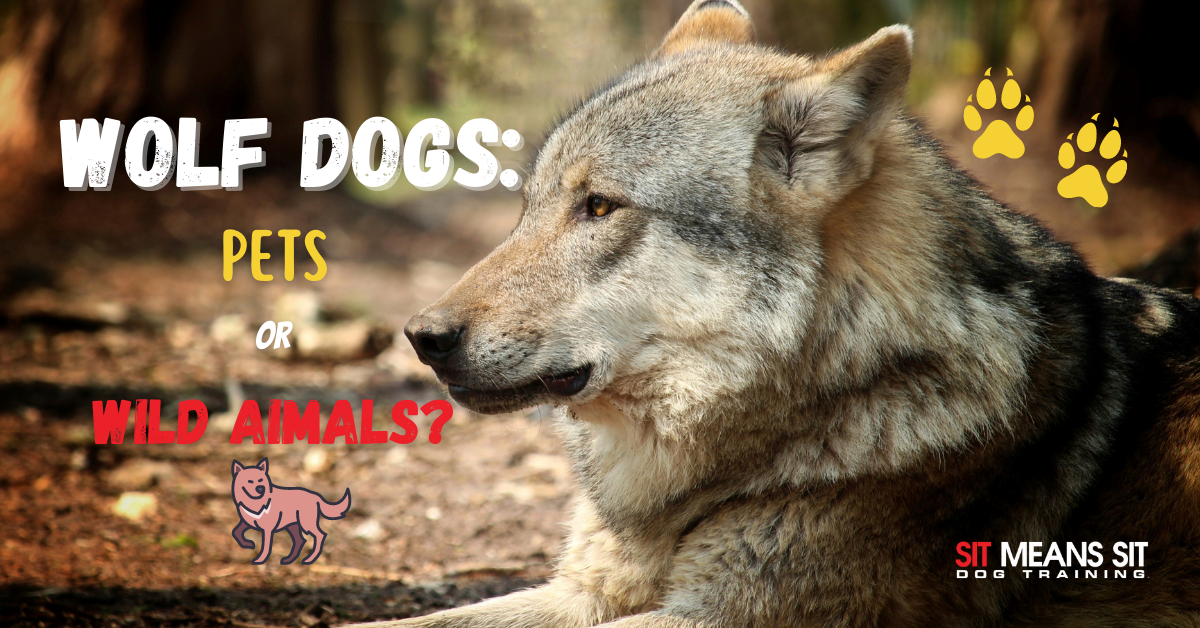
Wolf Dogs: Good Pets or Wild Animals?
Since the popular TV show, Game of Thrones, many fans and other people hopping on the trend have taken up the affinity of owning wolf dogs. Wolf dogs are dogs that have some sort of shared DNA with wolves. But these hybrid dogs are not your typical pup, wolf dogs are very different from the domesticated pooches we’re used to dealing with and the ownership of one should not be taken lightly or on a whim.
Wolf Dogs?
Wolf dogs originate from the breeding of a domesticated dog with a wolf species. The most common species of wolves are Ethiopian, Red, Eastern Timber, and Gray. But, most wolf dogs come from the crossing of a domesticated pooch and a Gray wolf. Many states have banned the ownership of wolf dogs while some allow ownership with a proper wildlife permit. This hybrid mix is varied in its legality between states, but there is one shared notion about wolf dogs, they’re extremely difficult to keep up with and come with great responsibility (more than usual dog-ownership). Due to these reasons, more and more wolf dogs are showing up to sanctuaries and shelters or even being abandoned by their owners. Many of these owners are initially drawn to wolf dogs for their “exotic” nature or status but prove they are unfit for the challenges that come with hosting a “wild” animal.
Cons of Wolf Dog Ownership
While having a regular, domesticated doggie in the house brings out joy, owning a wolf dog can actually put some stress on your household due to the amount of work needed to care for this mix. Wolf dogs require a much more thought-out ownership as you need to ensure you keep them and others safe. For example, wolf dogs need to be surrounded by at least 8 foot high fences with base guards to prevent escape. They’re not like most domesticated dogs and can maneuver around simple shelters/restraints. They are also wary or untrusting of people they don’t know/aren’t used to so taking time away from the hybrid (like on vacation) can be very difficult and maybe even impossible. Wolf dogs are not typical domesticated pets and they should not be treated as such, here’s a list of behaviors to consider when thinking about owning a wolf dog:
Roaming
Wolf dogs take after their wolf DNA side most of the time. This means that just like wolves, wolf dogs like to roam. Wolf dogs typically roam or “patrol” the area, covering nearly 30 miles in a day in order to protect their “resources”. Someone who owns a wolf dog will need to have lots of acres to cater to this hybrid behavior.
Dangerous
While wild wolves are usually fearful of human interaction and flee, wolf dogs tend to act out when confined or feel threatened. Wolf dogs are not inherently dangerous, but they may be unpredictable and can get aggressive if provoked. Wolf dogs are also somewhat predatory and protective over their “resources”, making children and small dogs/other animals vulnerable to an unfortunate situation.
Vet Care
Many veterinarians that work on domestic animals, such as most vet clinics or hospitals that don’t cater to other animals like horses or cows, will not medically serve a wolf dog. Finding vet care is particularly difficult as many veterinarians won’t work on wolf dogs due to issues with liability.
Where Do Wolf Dogs Go After Failed Ownership?
When people realize that they are incapable of providing the extensive care that is needed in keeping a wolf dog, they likely abandon them. So, what happens to the hybrid in this scenario?
The breeding facilities that “make” these hybrids often turn great profits, but the sanctuaries that wind up with most of the failed ownerships suffer as they lack resources to deal with the influx of turned-in wolf pooches. There is usually only so much space allocated at sanctuaries as many are non-profits working on private donations, which means there’s not enough room to consistently care for wolf dogs that are being brought in.
Sanctuaries try their absolute best to take in as many abandoned wolf dogs as possible, but with rising numbers of abandonment, the task is getting harder every day. Sanctuaries work to provide care to these hybrids, rehome them whenever possible (but the process is long and tiresome), and educate the public about the ownership of “exotic” animals like wolf dogs that are often abandoned. If you would like to help support a local sanctuary’s efforts, contact them about a donation, in these cases, all donations give aid!
Wolf dogs are strong, beautiful, and interesting animals, but they are not your regular household pet. They need a lot of attention and care just to meet their essential needs. Wolf dogs can be pets to the right unique owner, but potential owners must be knowledgeable about the hybrid before even considering taking one in. Wolf dogs come with a huge responsibility and care burden. Learn more about wolf dogs at your local sanctuary and look into a domesticated dog that resembles these majestic animals instead.
